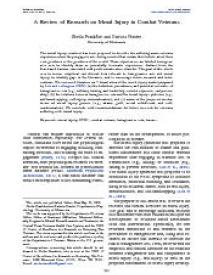A review of research on moral injury in combat veterans
The moral injury construct has been proposed to describe the suffering some veterans experience when they engage in acts during combat that violate their beliefs about their own goodness or the goodness of the world. These experiences are labeled transgressive acts to identify them as potentially traumatic experiences distinct from the fear-based traumas associated with posttraumatic stress disorder. The goal of this article was to review empirical and clinical data relevant to transgressive acts and moral injury, to identify gaps in the literature, and to encourage future research and interventions. We reviewed literature on 3 broad arms of the moral injury model proposed by Litz and colleagues (2009): (a) the definition, prevalence, and potential correlates of transgressive acts (e.g., military training and leadership, combat exposure, and personality), (b) the relations between transgressive acts and the moral injury syndrome (e.g., self-handicapping, self-injury, demoralization), and (c) some of the proposed mechanisms of moral injury genesis (e.g., shame, guilt, social withdrawal, and self-condemnation). We conclude with recommendations for future research for veterans suffering with moral injury. (PsycINFO Database Record (c) 2016 APA, all rights reserved)
Geachte bezoeker,
De informatie die u nu opvraagt, kan door psychotraumanet niet aan u worden getoond. Dit kan verschillende redenen hebben,
waarvan (bescherming van het) auteursrecht de meeste voorkomende is. Wanneer het mogelijk is om u door te verwijzen naar de bron
van deze informatie, dan ziet u hier onder een link naar die plek.
Als er geen link staat, kunt u contact opnemen met de bibliotheek,
die u verder op weg kan helpen.
Met vriendelijke groet,
Het psychotraumanet-team.
In: Military psychology, ISSN 0899-5605 | 28 | 5 | september | 318-330
http://dx.doi.org/10.1037/mil0000132


